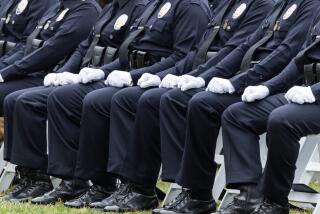Police Going On-Line Due to Run-In With Court
The Torrance Police Department will computerize its internal affairs records in an effort to discover the most common types of police misbehavior and to standardize discipline, a department official said this week.
The new computer program, to be put in place early next year, is one of several changes to follow a civil trial that pitted the Police Department against John Rastello of San Pedro.
Police officials said this week that new procedures in the department are not an acknowledgment of wrongdoing in the Rastello case but an attempt to improve efficiency and bolster public confidence.
Rastello won a $5.5-million jury verdict in September, as a result of a 1984 traffic collision between his son, Kelly, and off-duty Torrance Police Sgt. Rollo Green. The younger Rastello died in the crash. A Los Angeles Superior Court jury awarded damages, after finding that fellow officers covered up Green’s responsibility for the crash as part of a Torrance police pattern of condoning misconduct.
The city has appealed the verdict.
Officials at City Hall and in the Police Department insist that there was no cover-up for Sgt. Green and that they do not condone misconduct. “I have not seen any basis for criticism,” Mayor Katy Geissert said this week.
The city has rejected calls by Rastello’s lawyers to fire longtime Chief Donald Nash, create a citizens committee to review police misconduct and ask neighboring police departments to investigate traffic accidents involving Torrance officers.
“I have not received mail from the public that would demand that sort of thing,” Geissert said. “In fact, I have had very little mail on this subject.”
Some changes in procedure will be made, police officials said.
Nash has already ordered that a higher-ranking officer be called in to supervise the investigation when an officer is implicated in misconduct.
On the night that Green and Rastello collided, Sgt. Michael Paolozzi was called to Rolling Hills Road to lead the review of the crash. Rastello’s lawyers said that Paolozzi did not order Green to take a blood-alcohol test, in part because Green was of equal rank and had spent more years on the force.
Green had admitted drinking that night but said he was not drunk. Paolozzi and other officers have steadfastly denied that Green influenced their investigation.
The department will eliminate even the appearance of impropriety in the future by calling on senior officers to conduct such investigations, said Lt. Robert Armstrong, the commander of the department’s personnel division.
The reports that internal affairs investigators complete will be processed in a new way, as well.
Police officials said they sometimes found it difficult to find files requested by Rastello’s lawyers during protracted pretrial preparations.
The Police Department eventually turned over more than 500,000 pages of internal affairs files, memos and reports. But the reports sometimes were not cross-referenced, so that the same incident of misconduct might be recorded in an internal affairs file and a separate folder for public complaints, Armstrong said.
From now on, research will be simplified because misconduct files will be kept in one place, Armstrong said.
A computer summary of the information will tell officials which officers have the most complaints, what types of misconduct are most common and how officers are disciplined.
“It’s going to help us in making our discipline more consistent,” Armstrong said, “and by letting us take a look and see where our major discipline problems are coming from--what are the areas where we need to work harder in training.”
Armstrong said the computer summaries might also help the department rebut charges that it has condoned or covered up misconduct.
“The idea is always to generate public confidence in what you are doing,” he said.
More to Read
Sign up for Essential California
The most important California stories and recommendations in your inbox every morning.
You may occasionally receive promotional content from the Los Angeles Times.











